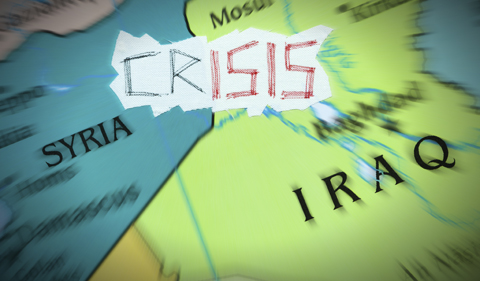Recent developments in the Middle East, including the death of King Abdullah of Saudi Arabia, the U.S. bombing campaigns and ISIS in Syria and Iraq, and the situations in Egypt, Yemen, and Libya were all discussed as Dr. Ziad Abu-Rish, Assistant Professor of Middle East History at Ohio University, was a live guest on Pacifica Radio Network’s KPFK.
Abu-Rish was joined on the show by Professor Asli Bali of the the UCLA School of Law, who spoke at length about the current status of U.S.-Iranian nuclear negotiations and the Israeli Prime Minister’s announced visit to Washington, D.C..
The live appearance lasted the full hour of the Jan. 25 episode of Middle East in Focus, marking the four-year anniversary of the uprising that toppled Husni Mubarak. Though the episode aired prior to news that ISIS had killed a captured Jordanian air force pilot, Abu-Rish and Bali sought to address long term dynamics.
Noting President Obama’s State of the Union address—where the President said he would seek new Congressional authorization to use force against Islamic State forces in Syria and Iraq and noted the stop in the advance of Islamic State forces—the host Estee Chandler asked if it was indeed the case the U.S. bombings are making a difference and what the politics behind this policy might be.
“I think there is no doubt that the Islamic State represents a threat to the well-being of many people in the Middle East, as does the continuance of authoritarian regimes, Israeli militarism and U.S. policy across the region. And I think what we really have to ask ourselves is, ‘Are we looking at short-term or long-term solutions?’ Because the rise of the Islamic State in the Middle East is no doubt a byproduct of the invasion and the destruction of the Iraqi state as well as the bankrolling of arms and anyone who wanted to go fight in Syria to be able to go there,” Abu-Rish said.
“The problem we’re seeing with ISIS in the Middle East is that we don’t have very much information and it’s not clear if the airstrikes led by the United States are designed to actually change the balance of power with the Islamic State or merely to look like that type of intervention is going on. And what’s most disturbing is that we know ISIS is a symptom of a problem and that the U.S., even with airstrikes, is not showing any desire to change the root problems with regard to the Middle East. And furthermore, U.S. military strikes in the Middle East have never resulted in a better outcome for the people on the ground in the Middle East.”
Asked about the “root problems” he was referring to, Abu-Rish answered, “We can start with the simple fact that the Islamic State is a political, military and religious movement that sprung up out of the destruction that we witnessed in Iraq as a result of U.S. invasion, occupation and counter-insurgency policies, and the sectarian policies of the government of Nouri al-Maliki, which the United States and Iran had backed. And so we really need to ask ourselves what else is going on in the Middle East that allows for such a group to emerge. We need to move away from these kind of cultural arguments of ‘that’s just what politics in the Middle East looks like’ and to ask ourselves what policies and practices exist.
“And I would relate that [dynamic in Iraq] to the situation in Syria, when Saudi Arabia, the United States and Turkey thought that the regime of Bashar al-Assad would fall within weeks or months of the uprisings. They basically gave carte blanche to anyone who wanted to fund an armed opposition to Bashar al-Assad or anyone who wanted to go and fight in Syria.… It allowed for the spread of various groups, including ISIS, from Iraq to Syria, in which ISIS was able to consolidate itself,” Abu-Rish said.
“I think the emergence of ISIS is a reflection of Middle Eastern states that do little to represent the interests of its people and of decades of war that have allowed these groups to emerge in the absence of state institutions in places like Iraq and now in Syria.”
For the entire interview, select the Jan. 25 episode at http://archive.kpfk.org/index.php?shokey=meif.




















Comments